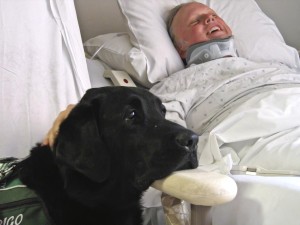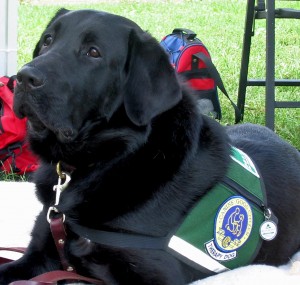Purr-fect prescription | by

Patients, doctors find health benefits of four-legged friends

During the last year of Stuart Bush’s life, he and Sandy were inseparable. Riding in her carrier, Sandy accompanied Stuart to chemo treatments. When he was hospitalized out-of-state, his wife smuggled the little dog onto the ward in her purse. “She was his constant companion, making him laugh and helping him forget — even for a little while — what he was going through,” Bush says.
Witnessing that bond had a profound effect on Joann Bush. About a year after her husband’s death, she and Sandy entered the rigorous certification process to become an animal therapy team. Today, the duo puts many smiles on Denver-area hospice patients’ faces, particularly if Sandy takes a lap or offers her frequently-coveted doggy kiss. “Some of them absolutely insist that they get a kiss,” Bush says.
Undivided attention
Like the Bushes, many pet owners find the attentive, non-judgmental support provided by companion animals a powerful buffer against grief and stress. Pets don’t care what we look like or what mistakes we make.
And unlike human companions, they’re largely immune to distractions. “The animals aren’t sitting there texting or worrying about what’s on the news,” says Diana McQuarrie, founder and executive director of Denver Pet Partners. “When they’re with the patient, they’re really focused on them. It’s very empowering.”
Research suggests that when we’re stressed or anxious, pets are actually more comforting than family members. In one study, participants’ heart rate and blood pressure were measured as they performed timed arithmetic or held one hand in freezing water. As a group, the subjects showed significantly less stress response when a pet cat or dog was in the room. In fact, stress responses were greatest when a spouse was present.
McQuarrie has seen this phenomenon in action when she’s accompanied animal therapy teams to hospital telemetry units. “There was a noticeable decrease in heart rate when they were interacting with the dog,” she says.
She and her therapy dog, Rigo, once visited a young man who had been burned over most of his face and body. At one point, tears started to roll down the man’s cheeks. McQuarrie asked him if he wanted to share what had made him cry. The patient said he felt that others were repelled by his appearance. “But Rigo, he’s beyond that,” he said. “He sees me on the inside.”
Good for the heart
The emotional effects of the human-animal bond are often apparent. But can owning a companion animal actually stave off
“real” physical health problems? Experts say yes. After reviewing existing data, a panel of experts at the American Heart Association found evidence that dog ownership was associated with a decreased risk for cardiovascular disease, the leading cause of death in the United States.
The team qualified its findings, noting that further, more rigorous research is needed. However, they found modest evidence that pet ownership improves risk factors like blood pressure, cholesterol level and stress response. In one study, dog owners who had heart attacks were up to four times more likely to be alive a year later than their pet-less counterparts.
Some of the strongest evidence involves pets and blood pressure. When 48 hypertensive stockbrokers were treated with medication, almost all showed improvement. But in stressful situations, their blood pressures shot back up. Unless, that is, they owned a dog or cat. The benefits of pet ownership and medication were significantly greater than medication alone.
As a group, dog owners also get more exercise. Researchers at the University of Missouri found that people were more likely to stick with a 12-week exercise program when they walked with a dog rather than a friend or spouse. (Participants reported that human companions often talked each other out of exercising, especially on hot summer days. But they felt the dogs were counting on them.)
Animal hospital?
In the halls of Swedish Medical Center in Englewood, four-footed therapists can often be seen amid the bustle of physicians, nurses and technicians. As part of the hospital’s animal-assisted therapy program, dogs and their handlers move from room to room, visiting patients and families, often on doctor’s orders.
Dr. Lilly Klancar, an oncologist at Swedish Medical Center, says the animals provide much-needed levity. In fact, she’s become accustomed to being upstaged. “I’ve been in the room with patients who were very interested in what I had to say,” she says, laughing. “And then the dog shows up, and I become very unimportant.”
When taking a patient’s history, Klancar always asks about pets. “In oncology practice, it’s very important to know the social structure of the patient, who their support systems are,” she says. If the patient has a dog, she’ll often suggest they walk together as a way to combat the fatigue and side effects of chemotherapy. “It’s a way to make exercise not a chore but more of a pleasure,” she says.
Keeping it safe
Klancar says she’s surprised at how many cancer patients worry about catching an infection from their animals. “Some people ask, do I need to get rid of my pet, or have someone take it for a while?” she says.
Fortunately, the answer is almost always no. “They don’t carry any more disease than you encounter on objects — or even on your own skin,” Klancar says. She does urge patients with compromised immune systems to wash their hands after handling their animals and to avoid bites and scratches. “But just petting them?” she says. “It’s not unlike shaking someone’s hand.”
Moreover, McQuarrie, who coordinates the dog program at Swedish, says Denver Pet Partners adheres to rigorous, evidence-based risk-management standards. “We stress infection control, and we’re very particular about following the tenets of human-animal interaction to ensure that it’s safe and effective,” she says.
Making it mutual
While there’s a probable link between pet ownership and better health, pets should never be acquired for only that reason. The owner’s primary motivation should always be to give the animal a good home. “How we as human beings treat animals really says a lot about our character,” McQuarrie says. “Our regard for other life, and the depth of our compassion, really comes through in how we treat other living things.”
Tags: Swedish Medical Center
Comments
Leave a Comment
Please be respectful while leaving comments. All comments are subject to removal by the moderator.



Diana McQuarrie you do a wonderful job with your Denver Petpartners and their Therapy Dogs. You have brought peace and Happiness in many patients minds while visiting them with your Therapy Dogs.
May God continue guide and bless you.
From some one who loves you and prays for you
in Edmonton, Alberta, Canada.